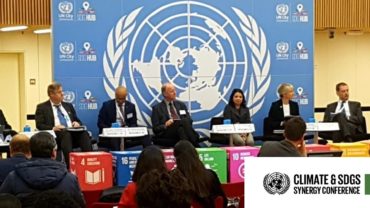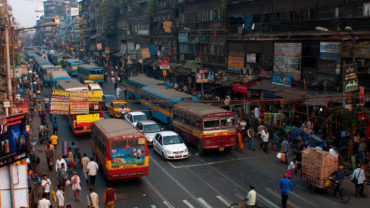As global temperatures rise and the growing energy demands of air conditioning threaten to emit more greenhouse gases, over 20 leaders committed to a new global effort on clean and efficient cooling. The commitments mark the launch of the Cool Coalition, aimed at making a positive impact on climate change, help achieve sustainable development and save money.
Launched at the First Global Conference on Synergies between the 2030 Agenda and Paris Agreement, the Cool Coalition aims to inspire ambition and accelerate action on the transition to clean and efficient cooling. An area that has previously been a blind spot in climate efforts.
The Cool Coalition offers a three-in-one opportunity for governments and cities in developing countries to cut global warming, improve the lives of hundreds of millions of people and make huge financial savings.
Cooling is not just a blind spot, but a sweet spot for climate action.
The Cool Coalition is a unified front that links action across the Kigali Amendment, Paris Agreement and Sustainable Development Goals. It will inspire ambition, identify solutions and mobilize action to accelerate progress toward clean and efficient cooling. Through UNEP DTU Partnership’s engagement in the Sustainable Energy for All initiative, the partnership is also contributing to this new coalition.
Built on a strong community, the Cool Coalition will give joining partners the opportunity to assess cooling solutions and move towards implementation of climate friendly efficient projects.
The launch of the coalition was opened by Dorthea Damkjær, Senior Advisor from the Danish Ministry of Foreign Affairs, a founding member of the coalition.
On behalf of the ministry, she welcomed participants to the launch event, noting the complexity of cooling in a warming world:
“Cooling is a lifesaver, keeping our children healthy, vaccines stable, food fresh and economies productive. But the more we cool, the more we heat the planet. Cooling is a blind spot, one of the most critical issues, yet overlooked.”
The future we don’t want
2018 was the fourth-warmest year on record, with unprecedented peak temperatures recorded across the planet. Already, 30 % of the world’s population face potentially dangerous temperatures for more than 20 days a year and heatwaves cause more than 12,000 deaths annually.
Heatwaves are especially a problem in cities around the world, where temperatures in general are higher, Shannon Lawrence, Director of C40 pointed out, adding that extreme heat is the number one killer in US cities.
“We feel the increasing heat in our cities each year, and we see the consequences, The cool Coalition is essential to address this crisis,” she said.
Referring to a recent report from C40 titled “the future we don’t want”, she told the audience that in a decade the number of cities exposed to extreme heat will triple due to climate change. This climate crises causing extreme heat is in turn causing a cooling crisis, which needs to be addressed.
The coalition includes ministers of environment from Chile and Rwanda and Foreign Affairs from Denmark as well as the heads of Danish engineering firm Danfoss and ENGIE, and the leaders of civil society, research, academia and intergovernmental institutions. The Cool Coalition is a global effort led by UN Environment, the Climate and Clean Air Coalition, the Kigali Cooling Efficiency Program, and Sustainable Energy for All (SEforALL).
The face of climate action
The Champions in the Cool Coalition will inspire action by providing good examples to follow, share cases and the science behind, securing high level commitments, motivating others for action, promoting collaboration and advocating for more innovation, greater investment, better information, and increased capacity to move towards clean and efficient cooling.
Among the members of the coalition and the panellist, launching it is Danfoss, world industry leader in heating and cooling systems. Danfoss Head of Public Affairs, Julia Panzer put the company’s engagement into perspective during the launch:
“If in 2050 there is no healthy planet, there are no healthy costumers.”
Jerome Evangelio Ilagan, Chief, Policy Research and Development, Climate Change Commission, Philippines pointed to the complexity of cooling major cities from experiences in “the sunshine city of Manila:
“Cooling is not just about infrastructure, it’s about health, food, green spaces. Cooling is the face of climate action in developing countries”
From Mexico, the importance of not just action on cooling, but international cooperation such as the Cool Coalition was highlighted by Andrea Hurtado-Epstein, Deputy Director, Ministry of Foreign Affairs.
“Energy demand from both heating and cooling is increasing in Mexico and worldwide. International cooperation is key to tackle this. Technology transfer will be fundamental for Mexico to meet the cooling needs without aggravating the climate crisis,” she said.
The importance of working on international and regional levels was also stressed by Carlos Fuller, International and Regional Liaison Officer, Caribbean Community Climate Change Centre.


